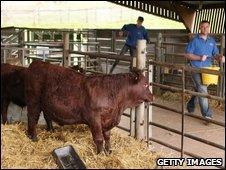Petting farm visitors 'need more E. coli protection'
- Published

Godstone Farm attracts up to 2,000 visitors a day at the height of summer
More must be done to protect people visiting children's farms, experts say.
The warning was made by the inquiry investigating the UK's biggest ever farm outbreak of E. coli.
More than 90 people got the potentially-fatal O157 strain of the bug at Surrey's Godstone Farm last year.
The investigation found public safety had been "neglected" as better procedures at the farm may have stopped the outbreak.
It also found quicker action by health officials could have limited it.
The independent panel, led by University of London infection expert Professor George Griffin, said safety measures on the farm were "inadequate" as they primarily relied on visitors washing their hands.
Indeed, it said it was "very likely" the whole outbreak could have been avoided if more attention had been paid to preventing visitors being exposed to animal waste.
Straw at the main barn, where children could pet animals, was sometimes left for three months before it was changed - a practice known as deep litter which is commonplace, the experts said.
They called for this to stop and urged farms to introduce vigorous cleaning of petting areas or even consider not letting children come into contact with the animals which most often carry the bug, such as cows, sheep and goats.
The panel said a code of practice, covering issues such as farm layout and hand-washing facilities, was needed to ensure this growing industry maintains the highest standards.
But it was also critical of the response of the regulatory agencies. Officials at the local authority, Tandridge District Council, and the Health Protection Agency were slow to act.
If they had stopped contact with the animals when the alarm was first raised the outbreak could have been limited to 33 people, it said.
Instead, 93 were struck down - 76 of whom were children under the age of 10.
Professor Mark P Stevens of The Roslin Institute explains what is E. coli O157
Legal action
Some of those are still ill with kidney damage and a group of parents is preparing to launch legal action for damages.
Professor Griffin said there had been a "lack of leadership" and a more "robust" approach to such attractions was needed.
However, he stressed draconian measures such as bans would be inappropriate.
"In the context of what happened at Godstone, a new framework for the future which is explicit and unambiguous is clearly needed."
Justin McCracken, head of the HPA, said he was "very sorry" for the failings of his organisation.
"I am determined that the HPA will work with the other bodies to prevent a similar situation developing in the future."
Since last year's outbreak, the rules on E. coli O157 have changed, making some of its symptoms notifiable in the way smallpox or measles are. Doctors now have to notify the relevant authorities if they detect signs of the infection.
Jackie Flaherty, the owner of Godstone Farm, which has now reopened, described the incident as "dreadful" and expressed sympathy for all those who had become ill.
"The safety and welfare of visitors to the farm is always important to us."
She added she would welcome a code of practice and new measures to improve safety and regulation.
"We're keen to take part in the consultation process which may be set up. It should ensure there's a framework of reasonable practical measures that all open farms can put in place and that lessons can be learned from this outbreak."
- Published15 June 2010
- Published15 June 2010
- Published11 June 2010